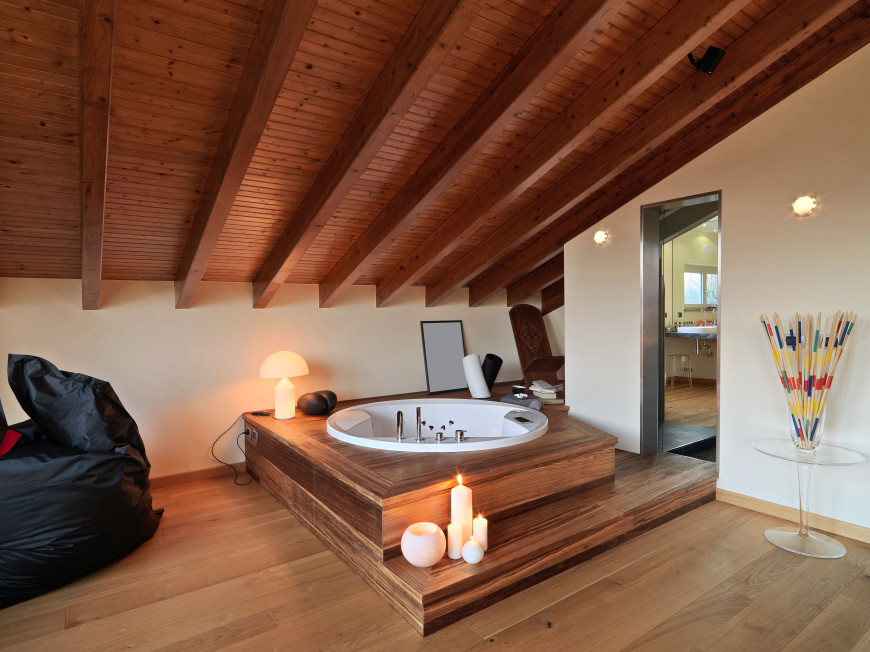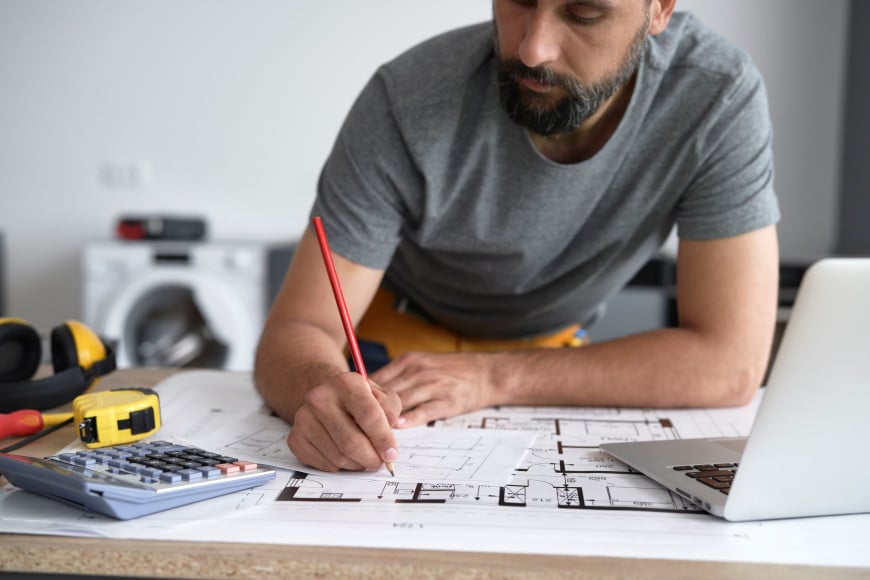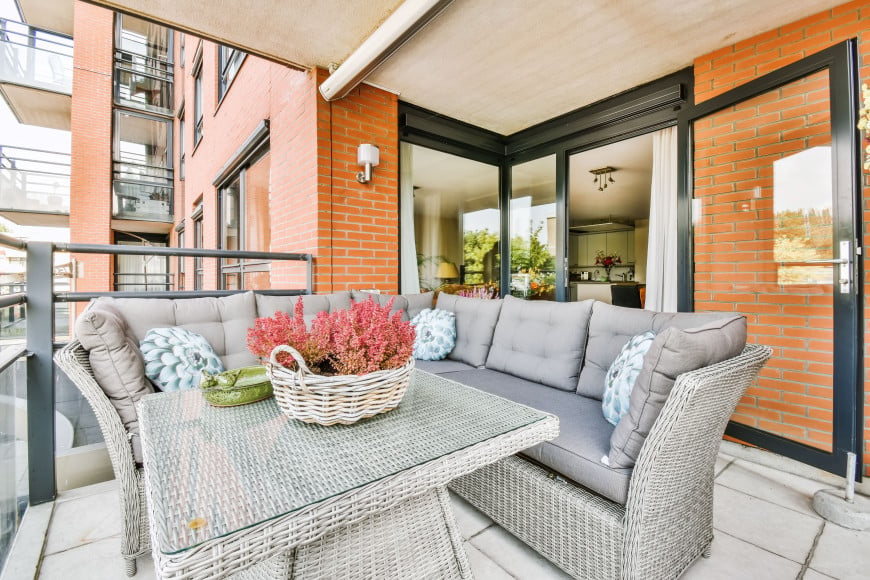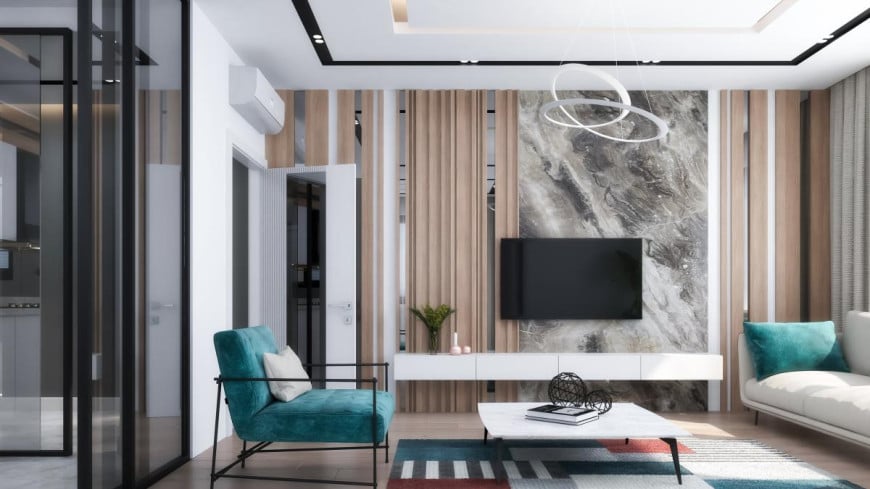In most cases, living space is one of the deciding factors when choosing a property, as is the location of the house, floor, complex infrastructure, and the surrounding area.
Whether you're looking for a small apartment or opting for a luxurious villa, space is an aspect you'll surely consider.
Just as many countries divide room area into total and residential, in Turkey, the concepts of gross and net are used.
Real estate agency Tolerance explains the differences between the two, which area is indicated in official documents, and how housing area calculation is performed.
What is "gross area" and "net area"
In Turkey, it's common to divide the area into gross and net.
In planning and sales advertisements, the gross area is usually indicated, and an inattentive buyer during a housing inspection may be in for an unexpected surprise: The space truly fit for living ends up being smaller than anticipated.
The terms gross and net are used to denote the property's area.
-
Gross — is the total area, which includes the entire built-up area of the building or complex.
Therefore, this includes the area of lifts shafts, stairwells, as well as internal and external walls, ventilation shafts, and balconies.
Such an area is calculated from the exterior wall side of your house. That is, the area is taken along the external perimeter and proportionally divided into the number of flats according to their size.
Some developers also include common use areas, such as underground parking, reception, fitness, and SPA centre, if they are located within the complex. -
Net — reflects the residential living areas, which includes all rooms, corridor, excluding interior walls, ventilation shafts, balcony or terrace.
Simply put, this is the area inside the flat you can physically step on.
Why is area division necessary?
We've grasped the difference between net and gross, as well as what is included in non-residential area .
But why was there a need to include in the gross not only the walls but even a part of common area territory with stairs, corridors, and the hall? And why exactly is it termed separately?
The reason is quite simple: In Turkey, the area of the residential complex, which includes the entire building or multiple buildings along with the adjoining territories, is considered to be the property of the flat owners.
The land beneath the property wholly belongs to the owners, which implies that they're responsible for its maintenance costs too. These expenses are often termed as 'aidat', meaning the fee one pays for upkeeping the property. In addition to this, the annual property tax is calculated based on this amount.
Why It's Important to Know the Difference Between Gross and Net Area
In earlier times, in TAPU (the official document concerning property rights in Turkey), the area of the flat wasn't mentioned at all. One could only see the share of the land that the owner would receive post-purchase.
Recently, the document was updated to include the total area (gross), and the usable residential area (net).
However, even these areas mentioned in TAPU could differ from the principles of calculation we described above.
Let's delve a bit deeper here.
Please note, when purchasing a property in Turkey, two crucial documents need to be checked.
- The most important is the TAPU, the property ownership document, obtained from the Land Registry Office.
- The second crucial document is the technical passport for your property, also known as Iskan (a certificate of habitability). This document is issued by the municipality where the property is located.
As the TAPU and Iskan are issued by different departments, the property's area mentioned in these may vary!
Please don't worry about this, as it's mainly due to the different systems used for calculating square meters by the municipality and the land registry office.
Often, a large difference between the actual area of flats and the area mentioned in the documents can be observed in duplex flats or penthouses. This is because such apartments include the space under the roof in the living area, which is not officially considered as square meters.

This is a normal situation in Turkey. If your house has received an Iskan, you don't need to worry about this.
Now, consider this scenario: A property owner who bought their property based on gross area puts it up for sale.
Of course, they would mention in the advertisement what is stated in the documents, i.e., the total area. This would not be considered fraudulent.
Therefore, prospective buyers inspecting the property might be surprised; they might have been expecting more spacious interiors, but see relatively smaller rooms in front of them. However, technically, the seller is right and isn't doing anything illegal.
Builders do the same: in their advertisements and price lists, they mention the price for everything that a new owner will get - the gross area.
By understanding the components of a flat's non-residential area, you can avoid falling for sellers who have less than honest intentions. For example, when comparing properties at the same price, you'll begin to pay attention to the area mentioned in the advertisement, ensuring you don't end up overpaying.
We advise against judging a flat solely based on photos — an experienced photographer can make even a tiny room appear spacious and majestic.
How to independently calculate the real area of a dwelling?
Knowing what the living area of a flat comprises, you can calculate it independently.
There is no absolute formula to carry out calculations without visiting the property: some experts advise subtracting 15% from the total area, others suggest as much as 30%.
This largely depends on the type of flat and how extensive your building or complex's infrastructure is.
A viable option—carry out the measurements yourself.
The calculation of a living space's area is done using a laser tape measure — measure the length and width of each room, then calculate their areas and sum it up.

What else needs to be known about housing in Turkey?
In Turkey, the concept of price per square meter is generally not utilised.
Flats of the same size in the same complex can have different prices depending on the floor, view, and the direction the windows face.
The rule of "the higher, the more expensive" applies, and flats with south-facing windows are pricier than northern-facing ones.
The former is due to the fact that high floors often offer stunning views of mountains or sea. Seeing beautiful landscapes out of your window is much more pleasant than looking at the internal courtyard of a residential complex.
As for the direction of the windows, it's simple: the more sunlight the flat gets, the cheaper it is to heat it during the cold season.
The cost of a real estate object is also affected by other factors: the year of the complex's construction, its infrastructure, the flat's layout, and the quality of the finish.
Another unique feature of Turkish real estate, as already mentioned above, is that the square footage of a flat includes the area of the balcony.

It might be hard for individuals accustomed to different climates to grasp that a balcony can be used just like a room.
The size of balconies in Turkey can vary greatly compared to other countries — in some complexes, they can reach 30 square meters and more.
This is comparable to an entire one-room flat.
Large balconies or terraces often accommodate small kitchens, complete with plumbing and drainage pipes.
With these amenities, residents find it easier to keep things clean and water plants, which usually decorate the balconies. Considering that balconies often serve as relaxation zones or dining areas in the summer, the existence of a small kitchen becomes even more convenient.
It's worth mentioning that all flats in new buildings are handed over to the buyers fully ready for move-in..
Here the concept of rough finishing doesn't exist - even budget accommodations are handed over with installed interior doors, plumbing, and often, fitted kitchens with appliances.
This saves new settlers a lot of trouble, including the big one — neighbours won't be making renovations for years, disrupting your peaceful relaxation.
Purchasing property in Turkey— is an excellent opportunity to invest funds wisely, as well as obtain a residence permit or citizenship of this hospitable country. Tolerance real estate agency will help you find the perfect option to fit any budget.
We are happy to answer all your queries, reach out to us on Whatsapp +90 (532) 158 42 44
Also, subscribe to our YouTube channel and Instagram page and receive information straight from the professionals!
An additional communication channel with us: Telegram
The Tolerance Team | 20 years by your side


